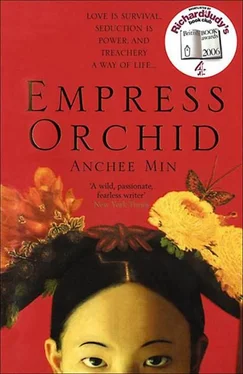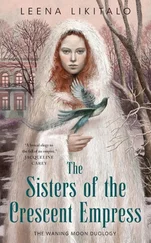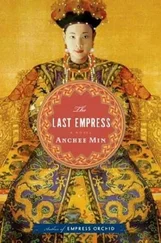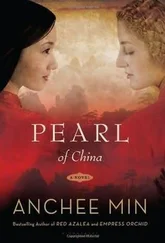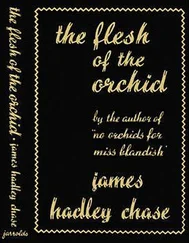“It must not be too different, my lady,” he murmured. Then he said something unexpected. “There is a chance to please yourself, my lady. If I were you, I would hurry to make an excuse.”
I didn’t know what he was talking about at first, but then I understood. I raised my hand and let it fall heavily on the eunuch’s face. “Scum!”
“You are welcome, my lady.” The eunuch stuck his neck up as if ready for another blow. “Hit me all you want, my lady. I’ll say what I have to. Tomorrow the official burial ceremony will begin. Empress Nuharoo has already declined to go. Emperor Tung Chih is also excused, for the weather is too cold. You will be the only one to represent the family and perform the farewell ceremony at the tomb site. The person to escort you will be Commander Yung Lu!” He paused, staring at me with his eyes glowing in excitement. “The journey to the tomb,” he whispered, “is long and lonely. But it can be made pleasant, my lady.”
I went to Nuharoo to confirm what An-te-hai had told me. I begged her to change her mind and go with me to the tomb. She refused, claiming she was busy with her new hobby, collecting European crystal. “Look how fascinating these crystal trees are.” She pointed to a roomful of glittering objects-shoulder-high glass trees, knee-high glass bushes with bells hung all over. Case after case and pot after pot were filled with glass flowers. From the ceiling silver-colored glass balls hung, replacing the Chinese lanterns. Nuharoo insisted that I pick one of the pieces to hang in my palace. I knew I wouldn’t hang it on my wall or in my garden. What I wanted was to have my fish and birds back. I wanted to have peacocks greet me every morning and pigeons flying around my roof with whistles and bells tied to their ankles. I had already begun the restoration of my garden, and An-te-hai had started training the new parrots. He had named them after their predecessors: Scholar, Poet, Tang Priest and Confucius. He paid a craftsman to carve a wooden owl, which he slyly named Su Shun.
I returned to my palace red-cheeked from walking in the snow. I had never felt so vulnerable. Something that should not happen, I desired to happen. I couldn’t put my feelings into perspective. I was afraid to face my own thoughts. All night long I had tried to push the odd images out of my head. I was on top of a cliff. One step and I would fall, and my son would be forced to award me a rope. My heart looked forward to what might happen on the way to the tomb, but my head dragged me back to my son.
My thoughts made the trip a long one. I was filled with anxiety and desperation. Yung Lu kept himself out of my sight even when we stopped at the mansions of provincial governors for the night. He sent his soldiers to attend to me, and asked to be excused when I requested his presence.
I was hurt. If we knew that we liked each other and were forbidden from ever pursuing a relationship, it would be easier on both of us to acknowledge our feelings. We might be able to turn the situation to some good or at least relax our guard. I understood that speaking of such emotions would be hard, but sharing pain was all we could achieve.
I was frustrated that I had not been given a chance to express my gratitude and admiration for him. After all, he had saved my life. I resented his distance and felt it strange that he so diminished his role in my rescue. He made it clear to me that if it had been Nuharoo in the jute sack, he would have behaved no differently. After his promotion, he returned a ruyi I had sent him. He said that he didn’t deserve it and led me to think that I was making a fool of myself. He hinted that there had once been a moment of attraction between us, but it had been short-lived on his part.
Sitting inside the palanquin, I had too much time to attend to my thoughts. I felt that I was two different characters. One was sane. This mind believed that there was a price to pay for being where I was, and that I should suffer my widowhood secretly until I died. This character tried to convince me that being the ruler of China should bring its own satisfaction. The other, insane character disagreed. She felt utterly trapped. She regarded me as the most deprived woman in China, poorer than a peasant.
I couldn’t agree or disagree with either side of myself. I didn’t believe I had the right to dishonor Emperor Hsien Feng, yet I didn’t think it was fair that I had to spend the rest of my life in isolation and loneliness. I warned myself again and again with historical examples of widowed Imperial concubines whose trysts had ended in severe punishment. I envisioned their dismemberment every night. But Yung Lu stayed in my mind.
I tried to tame my feelings in any way I could. From An-te-hai and Li Lien-ying I learned that Yung Lu had no romantic attachments even though matchmakers had been banging on his door. I thought I could do better and convinced myself that playing the role of matchmaker would release me from my pain. I needed to be able to face him with a steady heartbeat, because Tung Chih’s survival depended on harmony between us.
I summoned Prince Ch’un and Yung Lu to my tent. My brother-in-law arrived a little early, and I asked him about his baby boy and my sister Rong’s health. He broke down in tears and told me that my infant nephew had died. He blamed his wife and said that the baby had died of malnutrition. I couldn’t believe it, but then realized that it might be true. My sister had odd ideas about food. She didn’t believe in feeding her child “until he became a fat-bellied Buddha”; therefore she never allowed the baby to eat his fill. No one knew it was due to Rong’s mental illness until two of her other sons also died in infancy.
Prince Ch’un begged me to do something to stop Rong, since she was pregnant again. I promised I would help and told him to have some yam wine. In the middle of our conversation Yung Lu arrived. He was in uniform and his boots were covered with dirt. He sat down quietly and took a bowl of yam wine. I observed him as I went on speaking with Prince Ch’un.
Our talk led from children to our parents, from Emperor Hsien Feng to Prince Kung. We talked about how well things had turned out, about our luck in triumphing over Su Shun. I wanted to discuss the tasks ahead, the unsettling situation of the Taipings, the treaties and negotiations with foreign powers, but Prince Ch’un grew bored and yawned.
Yung Lu and I sat face to face. I watched him drink five bowls of yam wine. By then his face was deep red, but he would not talk with me.
“Yung Lu is attractive even in the eyes of men,” An-te-hai said that night as he gently tucked in my blankets. “I admire your willpower, my lady. But I am puzzled by your actions. What good does it do when you sound as if you don’t care for him at all?”
“I enjoy his presence, and that is all I can afford,” I said. I stared at the ceiling of the tent, knowing that a hard night lay before me.
“I don’t understand,” the eunuch said.
I sighed. “Tell me, An-te-hai, is the saying generally true that if one keeps grinding an iron bar, the bar will be turned into a needle?”
“I don’t know what people’s hearts are made of, my lady, so I would say that I am not sure.”
“I am trying to convince myself that there are interesting things in the world to live for besides… trying to obtain the impossible.”
“The result will be like chasing death.”
“Yes, like a moth that can’t resist the flame. The question is, can it do otherwise?”
“Love is poisonous in this sense. But one can’t do without love.” His voice was firm and self-assured. “It is an involuntary devotion.”
“I am afraid that this is not my only glance into the endlessly changing river of suffering.”
Читать дальше
